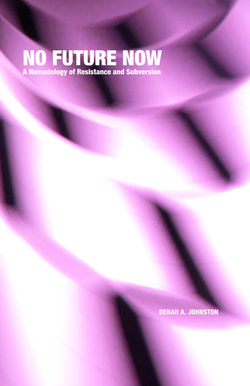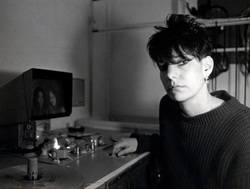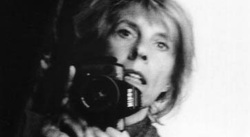BOOKS

No Future Now: A Nomadology of Resistance and Subversion (Atropos Press, 2012)
Investigating and interrogating underground film and music, this book calls on everything from the Situationist International to King Mob and the Sex Pistols, New York, Los Angeles and London Punk to No Wave and Nietzsche’s Nihilism. Unearthing and (re)constructing a Deleuzian-inspired hybrid genealogy-Nomadology (making a map instead of a tracing) from the Beats, American Underground and Avant-Garde film to Punk, No Wave and the Cinema of Transgression No Future Now creates a synesthesia of social, cultural and artistic consequences.
This book is a terminal review of key social, artistic, cultural and political factors that informs and locates close readings of seminal films, events and documents from 1974-1989. Considering essential influences in the underground from the 1950s-60s, No Future Now lays the groundwork for essential understanding of key movements, ideas and attitudes exploding in the 1970s. While tapping into cross-currents of subculture, style and moral panic on both sides of the Atlantic a golden spiral continually feeds and connects the never-ending chant of forward-thinking, on-the-edge (and often equally self-sabotaging) deviants, punks and queers located just below the radar spreading the word like gospel: “No Future Now.”
In the next five years I aim to expand the inquiry begun with this work through additional modes of study, creation and cultural engagement through iterations as a documentary film and curatorial screenings.
Investigating and interrogating underground film and music, this book calls on everything from the Situationist International to King Mob and the Sex Pistols, New York, Los Angeles and London Punk to No Wave and Nietzsche’s Nihilism. Unearthing and (re)constructing a Deleuzian-inspired hybrid genealogy-Nomadology (making a map instead of a tracing) from the Beats, American Underground and Avant-Garde film to Punk, No Wave and the Cinema of Transgression No Future Now creates a synesthesia of social, cultural and artistic consequences.
This book is a terminal review of key social, artistic, cultural and political factors that informs and locates close readings of seminal films, events and documents from 1974-1989. Considering essential influences in the underground from the 1950s-60s, No Future Now lays the groundwork for essential understanding of key movements, ideas and attitudes exploding in the 1970s. While tapping into cross-currents of subculture, style and moral panic on both sides of the Atlantic a golden spiral continually feeds and connects the never-ending chant of forward-thinking, on-the-edge (and often equally self-sabotaging) deviants, punks and queers located just below the radar spreading the word like gospel: “No Future Now.”
In the next five years I aim to expand the inquiry begun with this work through additional modes of study, creation and cultural engagement through iterations as a documentary film and curatorial screenings.
RESEARCH AGENDA
As a researcher I study film's distinct capacities to reflect the artist's thinking and feeling, evaluate and influence culture and transmit or evoke meaning in the mind of the viewer. I explore aesthetics, intention and various readings of filmic texts from independent productions to the mainstream. My writings and films articulate a theory and a philosophy about the ways in which meaning is produced and received. My teaching and research interests span experimental/avant-garde film and media (no wave and transgressive cinema); feminist film studies; historiography and semiotics; gay and cultural studies; subgenres (the esoteric and occult in art and cinema; the new Golden Age of television and new media platforms) and the restructuring of cinema in a post-medium era.
I synthesize scholarly and creative interests, using my filmmaking to deepen academic inquiry, engaging research topics through artistic work and curating forums where films, filmmakers and audiences can connect. A previous project, a moderated panel on underground LGBT cinema, received funding from the NEA and the Andy Warhol Foundation for the visual arts. Below are the projects currently in the works.
I synthesize scholarly and creative interests, using my filmmaking to deepen academic inquiry, engaging research topics through artistic work and curating forums where films, filmmakers and audiences can connect. A previous project, a moderated panel on underground LGBT cinema, received funding from the NEA and the Andy Warhol Foundation for the visual arts. Below are the projects currently in the works.
DOCUMENTING NO FUTURE NOW

Bette Gordon
No Punk Transgressions: A Punk, No Wave and Cinema of Transgression Retrospective, a proposed curation project, aims to widen the access to and understanding of film produced in New York City from the mid-1970s through the '80s by linking it to the American avant-garde and experimental work of the 50s-60s. These artists and films have been given short shrift in terms of criticism and accolades in the larger artistic community; however, their greater social importance is more evident now than ever. I am in contact with many key players who have kindly advanced my research and scope, including Vivienne Dick, Amos Poe, Bette Gordon, James Nares, Patti Astor, Charlie Ahearn, Ivan Kral, Michael Oblowitz, Beth B and Nick Zedd.
In the past few years there have been two well-received programs of work focusing on No Wave film at Oberhausen and Film Museum Vienna. However, more than a decade has passed since a program has addressed this material in New York, and a comprehensive program has never been presented on the West Coast. I plan to produce the first comprehensive West coast screening series of No Wave, punk and Cinema of Transgression films in nearly 40 years with artists in person for Q&A, panel discussion and presentation of early works alongside more recent works.
One of the overarching purposes of this programming is to expose a solid root of the origins of American independent film as well as provide a film-by-film map of established practices and models for contemporary underground and independent filmmakers, thus highlighting the renaissance of a true intersection of film, art and music.
In the past few years there have been two well-received programs of work focusing on No Wave film at Oberhausen and Film Museum Vienna. However, more than a decade has passed since a program has addressed this material in New York, and a comprehensive program has never been presented on the West Coast. I plan to produce the first comprehensive West coast screening series of No Wave, punk and Cinema of Transgression films in nearly 40 years with artists in person for Q&A, panel discussion and presentation of early works alongside more recent works.
One of the overarching purposes of this programming is to expose a solid root of the origins of American independent film as well as provide a film-by-film map of established practices and models for contemporary underground and independent filmmakers, thus highlighting the renaissance of a true intersection of film, art and music.
WOMEN filmmakers / COLLABORATORS

Gunvor Nelson
Another current area of focus is editing a collection of essays that focus on the contribution of female filmmakers to the field across genre, type and style. Particularly women such as Lynne Ramsay, Katherine Bigelow, Penelope Spheeris, Jane Campion, Agnès Varda, Dorothy Arzner, Julie Taymor and Sofia Coppola who challenge the notion that a woman must produce male-centered films to gain the establishment's attention. This book project will source new writing on filmmakers through the cinema's history, investigating the ways such artists transcend gendered representations in the production of their work regardless of form or substance.
An ongoing inquiry fueling that interest is my work to unearth the philosophy of French pioneer Germaine Dulac, who made the transition early on from commercial to avant-garde cinema. Few of her writings have been translated into English. This area of study includes exploration of her parallel work as an advocate for the film form, and of the way American experimental filmmaker Maya Deren reflects Dulac's legacy on behalf of film art and theory.
As a former Director Canyon Cinema Foundation I have had a unique opportunity to not only work with and review films in the collection but also communicate with filmmakers and build relationships with them. A substantial amount of films in the collection are made by women and are sadly underrepresented in critical and academic writing – highlighting the need for such a work. This volume could also help shape a new context in which to view the progression of experimental film history from Chick Strand, Gunvor Nelson, and Barbara Hammer to Stephanie Barber, Abigail Child, Alice Anne Parker Severson and Dorothy Wiley.. Additionally, I am researching and working with Donna Kerness and Melinda McDowell to document their history of collaboration and friendship amidst the cinematic production of underground giants George Kuchar and Curt McDowell.
An ongoing inquiry fueling that interest is my work to unearth the philosophy of French pioneer Germaine Dulac, who made the transition early on from commercial to avant-garde cinema. Few of her writings have been translated into English. This area of study includes exploration of her parallel work as an advocate for the film form, and of the way American experimental filmmaker Maya Deren reflects Dulac's legacy on behalf of film art and theory.
As a former Director Canyon Cinema Foundation I have had a unique opportunity to not only work with and review films in the collection but also communicate with filmmakers and build relationships with them. A substantial amount of films in the collection are made by women and are sadly underrepresented in critical and academic writing – highlighting the need for such a work. This volume could also help shape a new context in which to view the progression of experimental film history from Chick Strand, Gunvor Nelson, and Barbara Hammer to Stephanie Barber, Abigail Child, Alice Anne Parker Severson and Dorothy Wiley.. Additionally, I am researching and working with Donna Kerness and Melinda McDowell to document their history of collaboration and friendship amidst the cinematic production of underground giants George Kuchar and Curt McDowell.
